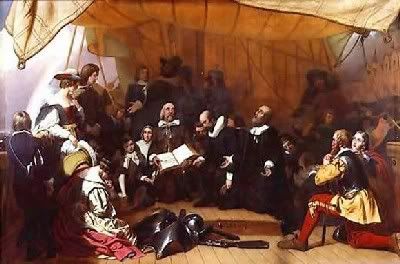Happy Thanksgiving
I delivered this homily at a special Ecumenical Christian service at Baptist Hospital Yesterday.

Thanksgiving is one week away. Can you believe it? Thanksgiving is a time to celebrate the wonderful gifts that God has given us out of his immeasurable supply of grace.
Thanksgiving began in 1863, when Abraham Lincoln declared it a national holiday. Of course, he was remembering, and we remember the first Thanksgiving, in the fall of 1621, more than 200 years earlier.
We remember the pilgrims who came to this land on a boat called the Mayflower. They landed the Mayflower at Plymouth Rock about this time of year, just before the winter. There were no cities, no houses, no grocery stores, no shops that sold blankets or clothes or even wood to make a house or a bed. God helped them to survive through the cold cold winter of what later became Massachusetts. They met some Indian friends who were tremendously helpful. When springtime came, their new friends helped them plant corn and cranberries and other vegetables. God helped them all along the way and when November came around again, they were so thankful to their Indian friends and especially to God that they had a special celebration. The pilgrims invited their friends and had a party that lasted for 3 days. They ate fish, chicken, turkey, corn, strawberries, grapes, beans, walnuts and a variety of other foods. This was the first Thanksgiving, 386 years ago.
On this special holiday we remember all the things we are thankful for. What were the pilgrims thankful for? Why did President Lincoln start the tradition of Thanksgiving, re-enacting this particular celebration? Well, to answer this question, we need to remember their story.
Before the pilgrims lived in America, they lived in England. Now in the early 1600s England was a very different place than it is now. This is shortly after the Reformation and religious tension was high. There was no such thing as religious freedom – the state dictated how and when and who you would worship. Our future pilgrims were caught between their conscience and the King, which meant that many of them were killed for their faith.
The pilgrims were desperate. They dreamed of a country where they could worship freely, but they needed a lot of money to sail all the way across the ocean to America. God performed a miracle to provide a boat called the Mayflower. It was a risky venture to travel on the open sea, especially for amateurs. The trip from the Old World to the New World took about 2 months. The Mayflower was not a big boat; really, it was pretty small by today's standards, easily tossed about on the open waters. The pilgrims could not cross the Atlantic Ocean by themselves. They needed to find professional sailors to go with them. But who would dare such a dangerous mission, for little or no money? Only people who had nothing to lose in life. Riffraff who could operate a boat but couldn't hold a job, and so they wanted to leave the Old World and find adventure.
On the trip, many of the pilgrims got seasick and disoriented and these sailors mocked and ridiculed them endlessly for sport. They prayed to God, and they knew that he was in control. In the end, none of the pilgrims died on the journey, which was a small miracle in itself.
So what were the pilgrims thankful for when they had the first thanksgiving meal in 1621? Certainly they were thankful for the good food, and their friends the Indians, and for the safe trip on the Mayflower, and for their families. But most of all, they were thankful that God saved them from a country where they could not worship him. Looking back, they had an overwhelming sense that God had carried them to the new world.
Today we are also thankful for good food we will enjoy next week. Perhaps you're already making plans for your great feast. We're thankful for the company of family and friends, for safe journeys of those who will travel far. But more than all of this, we are thankful that Christ saved us from a place where we could not worship him. Christ, by his life and death and resurrection, has brought us into a relationship with himself. We have been brought from death to life, from darkness to light, from oppression, to liberty, from the Old Word to the New World.
In one sense, our journey is complete, but in another sense, we are still on the way. This journey of life to the heavenly city is perilous indeed. At times we are seasick, disoriented, mocked and ridiculed. Yet, Christ is with us and we need not fear, for he is in control. And he when I say he is with us, I mean that in the end the sea will not destroy us, because, having already been destroyed by it, Christ assures us with confidence that he will give us safe passage to home and freedom.
Former slave-trader and hymn-writer John Newton was no stranger to sea travel. He said once, "The love I bear Christ is but a faint and feeble spark. But because he ignited it, and he maintains it, I trust many waters cannot overtake it."
While we were yet sinners, Christ died for us. And this is love, not that we loved him, but that he loved us and sent his son to be the substitute for our sin so that those of us to believe in Christ and call on his name, should not perish, but should be adopted as sons and daughters of the living God. This is what we are thankful for today, above all.

Thanksgiving is one week away. Can you believe it? Thanksgiving is a time to celebrate the wonderful gifts that God has given us out of his immeasurable supply of grace.
Thanksgiving began in 1863, when Abraham Lincoln declared it a national holiday. Of course, he was remembering, and we remember the first Thanksgiving, in the fall of 1621, more than 200 years earlier.
We remember the pilgrims who came to this land on a boat called the Mayflower. They landed the Mayflower at Plymouth Rock about this time of year, just before the winter. There were no cities, no houses, no grocery stores, no shops that sold blankets or clothes or even wood to make a house or a bed. God helped them to survive through the cold cold winter of what later became Massachusetts. They met some Indian friends who were tremendously helpful. When springtime came, their new friends helped them plant corn and cranberries and other vegetables. God helped them all along the way and when November came around again, they were so thankful to their Indian friends and especially to God that they had a special celebration. The pilgrims invited their friends and had a party that lasted for 3 days. They ate fish, chicken, turkey, corn, strawberries, grapes, beans, walnuts and a variety of other foods. This was the first Thanksgiving, 386 years ago.
On this special holiday we remember all the things we are thankful for. What were the pilgrims thankful for? Why did President Lincoln start the tradition of Thanksgiving, re-enacting this particular celebration? Well, to answer this question, we need to remember their story.
Before the pilgrims lived in America, they lived in England. Now in the early 1600s England was a very different place than it is now. This is shortly after the Reformation and religious tension was high. There was no such thing as religious freedom – the state dictated how and when and who you would worship. Our future pilgrims were caught between their conscience and the King, which meant that many of them were killed for their faith.
The pilgrims were desperate. They dreamed of a country where they could worship freely, but they needed a lot of money to sail all the way across the ocean to America. God performed a miracle to provide a boat called the Mayflower. It was a risky venture to travel on the open sea, especially for amateurs. The trip from the Old World to the New World took about 2 months. The Mayflower was not a big boat; really, it was pretty small by today's standards, easily tossed about on the open waters. The pilgrims could not cross the Atlantic Ocean by themselves. They needed to find professional sailors to go with them. But who would dare such a dangerous mission, for little or no money? Only people who had nothing to lose in life. Riffraff who could operate a boat but couldn't hold a job, and so they wanted to leave the Old World and find adventure.
On the trip, many of the pilgrims got seasick and disoriented and these sailors mocked and ridiculed them endlessly for sport. They prayed to God, and they knew that he was in control. In the end, none of the pilgrims died on the journey, which was a small miracle in itself.
So what were the pilgrims thankful for when they had the first thanksgiving meal in 1621? Certainly they were thankful for the good food, and their friends the Indians, and for the safe trip on the Mayflower, and for their families. But most of all, they were thankful that God saved them from a country where they could not worship him. Looking back, they had an overwhelming sense that God had carried them to the new world.
Today we are also thankful for good food we will enjoy next week. Perhaps you're already making plans for your great feast. We're thankful for the company of family and friends, for safe journeys of those who will travel far. But more than all of this, we are thankful that Christ saved us from a place where we could not worship him. Christ, by his life and death and resurrection, has brought us into a relationship with himself. We have been brought from death to life, from darkness to light, from oppression, to liberty, from the Old Word to the New World.
In one sense, our journey is complete, but in another sense, we are still on the way. This journey of life to the heavenly city is perilous indeed. At times we are seasick, disoriented, mocked and ridiculed. Yet, Christ is with us and we need not fear, for he is in control. And he when I say he is with us, I mean that in the end the sea will not destroy us, because, having already been destroyed by it, Christ assures us with confidence that he will give us safe passage to home and freedom.
Former slave-trader and hymn-writer John Newton was no stranger to sea travel. He said once, "The love I bear Christ is but a faint and feeble spark. But because he ignited it, and he maintains it, I trust many waters cannot overtake it."
While we were yet sinners, Christ died for us. And this is love, not that we loved him, but that he loved us and sent his son to be the substitute for our sin so that those of us to believe in Christ and call on his name, should not perish, but should be adopted as sons and daughters of the living God. This is what we are thankful for today, above all.


2 Comments:
The same sermon preached a year later.. maybe no one remembers, but this is essentially the same as last year's Thanksgiving post.
true. a few changes, but basically the same. I do have some new readers, maybe interesting for them.
Post a Comment
<< Home